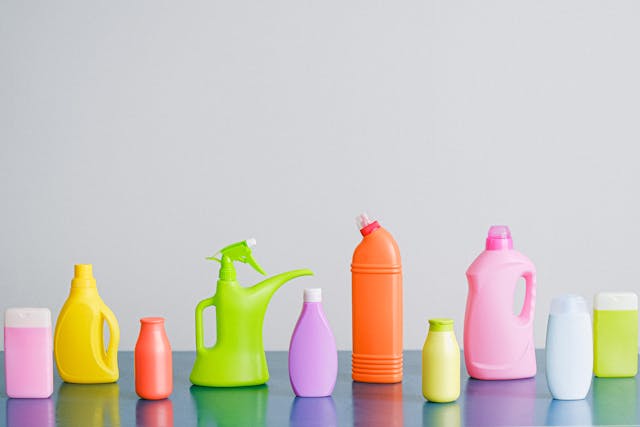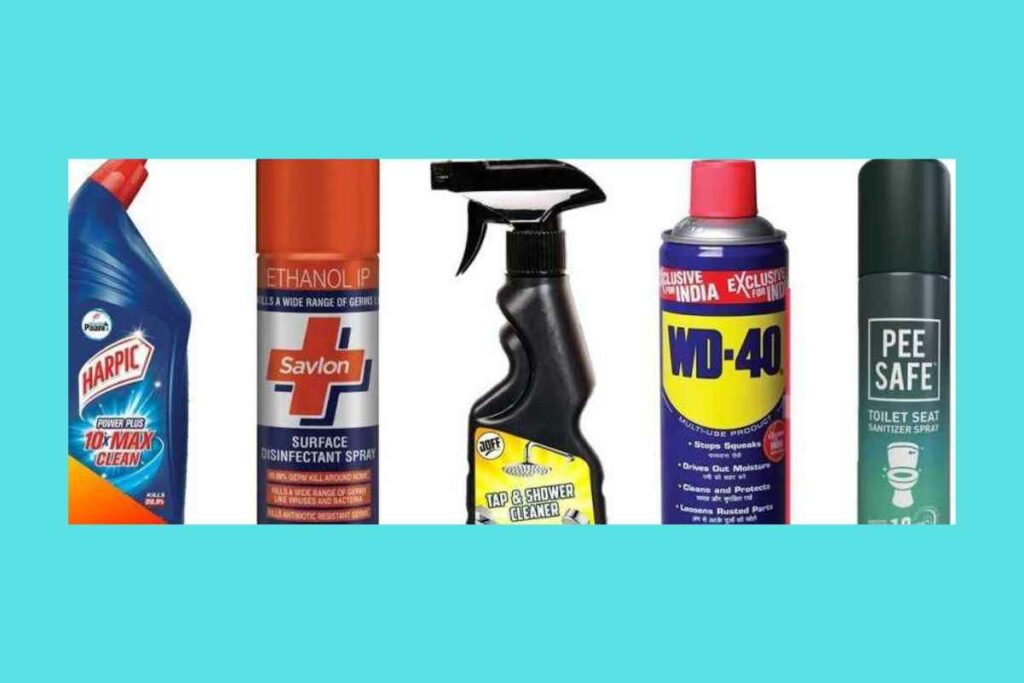It is generally not recommended to use bathroom cleaner in the kitchen.
Bathroom cleaners often contain stronger chemical compounds, such as bleach and ammonia, which are specifically formulated to combat bacteria found in toilets, sinks, and showers.
These harsh chemicals can damage kitchen surfaces like countertops and cabinets.
Instead, use kitchen-specific cleaners or all-purpose cleaners that are safe for food preparation surfaces.
Always check the label or manufacturer’s instructions before using any cleaner in your home.
Differences Between Bathroom and Kitchen Cleaners
Bathroom cleaners are formulated to tackle specific challenges, such as soap scum and mold, commonly found in bathrooms.
However, the needs of kitchen surfaces differ significantly. Kitchen cleaners are designed to handle grease, food stains, and other residues specific to cooking spaces.
What Specific Types Of Damage Can Bathroom Cleaners Cause To Kitchen Surfaces Like Countertops And Cabinets?
Using bathroom cleaners on kitchen surfaces like countertops and cabinets can cause damage such as scratches, discoloration, and surface damage.
Abrasive cleaners like The Pink Stuff can scratch the shiny finishes of stainless steel kitchen appliances, plated metals, enamel, and finished flooring.
It is not recommended to use bathroom cleaners in the kitchen.
Instead, it is suggested to use non-abrasive kitchen cleaners or warm, soapy water on kitchen countertops.
Baking soda can be used as a cleaning agent, but prolonged scrubbing may damage some materials.
It is important to avoid using abrasive cleaning tools like steel wool or scouring pads to avoid damage to the surface.

Are There Any Kitchen Surfaces That Can Tolerate The Use Of Bathroom Cleaner Without Damage?
It is not recommended to use bathroom cleaners on kitchen surfaces as they are formulated differently and may contain harsher chemicals that can damage kitchen surfaces.
However, some kitchen surfaces may be able to tolerate the use of bathroom cleaner without damage.
It is best to check with the manufacturer’s instructions or test a small, inconspicuous area first.
Alternatively, other cleaning solutions are safe for use on both bathroom and kitchen surfaces, such as a baking soda and vinegar mixture.
Some kitchen countertop materials that are resistant to germs and easy to clean include quartz, solid surface, granite, and laminate.
Are There Any Potential Health Risks Associated With Using Bathroom Cleaner In The Kitchen?
There are potential health risks associated with using bathroom cleaners in the kitchen.
Bathroom cleaners may contain harsh chemicals that can be harmful if ingested or inhaled.
According to the Cleveland Clinic, swallowing cleaning products can result in confusion, nausea, vomiting, breathing problems, and other symptoms, depending on what was ingested.
Children are more susceptible to these dangers.
The Environmental Working Group (EWG) provides information on cleaning product ingredients and rates the relative level of concern posed by exposure to the ingredients in a product.
The most acutely dangerous cleaning products are corrosive drain cleaners, acidic toilet bowl cleaners, and oven cleaners.
Corrosive chemicals can cause severe burns, while chlorine bleach and ammonia-containing products produce fumes that are irritating to your eyes, throat, and lungs.
It is important to use cleaning products that are specifically designed for the kitchen and to follow the instructions on the label.
What Are Some Examples Of Kitchen-Specific Cleaners That Are Safe For Use On Food Preparation Surfaces?
Several kitchen-specific cleaners are safe for use on food preparation surfaces.
Some examples include:
- Food-safe cleaners, such as MiracleSpray for Microwave and Cooktop
- All-purpose cleaners that are safe for use on kitchen surfaces, such as those recommended by The Spruce Eats
- Sanitizers that are safe for use on food contact surfaces, such as those listed by the USDA
It is important to check the label of any cleaner to ensure that it is safe for use on the specific surface you are cleaning.
Are There Any Alternative Natural Or Homemade Cleaners That Can Be Used In The Kitchen Instead Of Bathroom Cleaners?
Yes, several alternative natural or homemade cleaners can be used in the kitchen instead of bathroom cleaners.
Some of these include:
- All-natural kitchen cleaner made with vinegar, water, tea tree oil, and grapefruit essential oil
- Castile soap floor cleaner made with hot water, liquid castile soap, and essential oil
- Homemade all-purpose cleaner made with vinegar, baking soda, and water
- Homemade kitchen cabinet cleaner made with Borax, white vinegar, and dish soap
FAQs
Can I use any cleaner in the kitchen?
Not all cleaners are suitable for kitchen surfaces. It’s essential to use products specifically designed for kitchens to avoid potential damage.
What are the common ingredients to avoid in kitchen cleaners?
Harsh chemicals like bleach and ammonia are often found in bathroom cleaners and may not be suitable for kitchen surfaces. Look for kitchen-friendly alternatives.
Are DIY cleaners effective in the kitchen?
Yes, DIY cleaners with natural ingredients like baking soda and vinegar can be effective for various kitchen cleaning tasks.
Can using the wrong cleaner in the kitchen pose health risks?
Yes, mixing incompatible cleaners or using the wrong cleaner for kitchen surfaces can release harmful fumes, posing health risks.
How often should I clean my kitchen to maintain a safe environment?
Regular cleaning is crucial. Daily maintenance and thorough cleaning at least once a week contribute to a safe and hygienic kitchen.
Conclusion
In conclusion, using a bathroom cleaner in the kitchen is not recommended due to the distinct needs of these spaces. Understanding the differences, choosing the right products, and following proper cleaning techniques are essential for maintaining a safe and clean kitchen environment.







